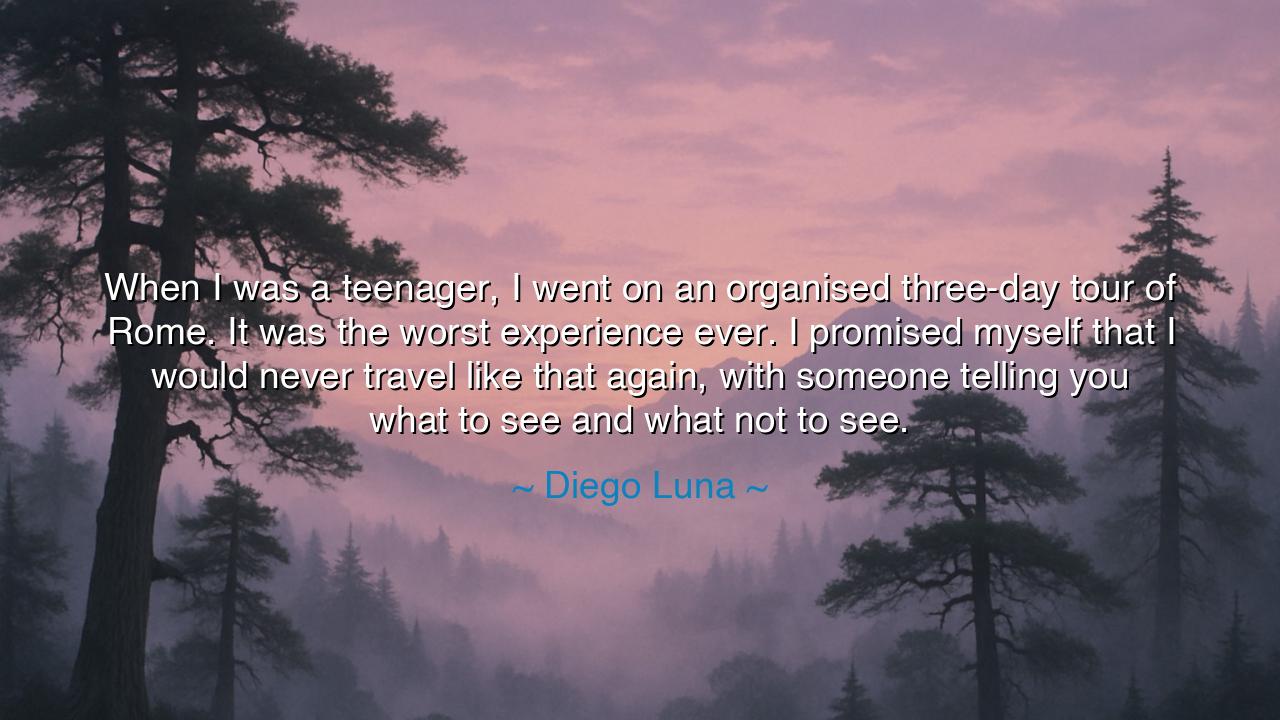
When I was a teenager, I went on an organised three-day tour of
When I was a teenager, I went on an organised three-day tour of Rome. It was the worst experience ever. I promised myself that I would never travel like that again, with someone telling you what to see and what not to see.






In the words of Diego Luna, spoken with honesty and youthful memory, we hear the cry of one who values freedom over control: “When I was a teenager, I went on an organised three-day tour of Rome. It was the worst experience ever. I promised myself that I would never travel like that again, with someone telling you what to see and what not to see.” At first glance, this is but a complaint about a trip. Yet in truth, it is a declaration of independence, a vow to walk the road of life with open eyes and free choice, rather than through the narrow lens imposed by others.
The tale begins with Rome, city of emperors and ruins, where the stones themselves whisper of glory and tragedy. To walk its streets is to walk upon the bones of history. And yet, for Luna, the experience was soured by the chains of an organised tour. Instead of discovery, there was instruction; instead of wonder, there was restriction. He was not allowed to meet Rome as a living city, but only as a series of preselected images. Here lies the first lesson: that beauty cannot be commanded, and truth cannot be handed down whole—it must be encountered by the seeker’s own eyes.
The vow he made—to never travel that way again—is more than a choice about tourism. It is the spirit of all who resist conformity, who reject being told what to think, what to see, what to feel. The ancients would have called this the birth of philosophy, for philosophy begins when one ceases to accept the dictates of others and begins to question for oneself. Just as Socrates walked through Athens asking questions no guide could script, so too did Luna awaken to the truth that discovery must be personal, not imposed.
History offers examples of this spirit. Think of Ibn Battuta, the Moroccan traveler who journeyed across Africa, Asia, and beyond. No itinerary dictated his path; he moved by curiosity, faith, and desire. Because of this freedom, his journeys became a tapestry of cultures, stories, and encounters far richer than any guided tour. Or recall Henry David Thoreau, who withdrew from the ordered life of society to dwell at Walden Pond. Both men chose freedom over prescription, authenticity over direction, and in so doing, found truths unseen by those who walk only where they are told.
The worst experience Luna recalls is not simply boredom—it is the suffocation of the soul when it is denied its natural hunger for exploration. To be told what not to see is to be told to close one’s eyes to the richness of existence. The spirit rebels against such commands because life itself is meant to be lived as discovery, not recitation. The lesson is clear: to truly know a place, a person, or even oneself, one must wander, question, linger, and encounter without boundaries.
Yet his story is not merely rebellion—it is guidance for us all. To travel freely is not to scorn teachers or guidance, but to balance them with curiosity. A wise guide can point to wonders hidden, but the true traveler must step aside from the group, breathe the air, and find their own rhythm in the city’s pulse. Otherwise, the journey becomes not experience but performance, and memory turns bitter rather than sweet.
So I say to you: when you travel, do not surrender your vision entirely to others. Take advice, learn from the knowledge of guides, but claim for yourself the right to wander down an unmarked street, to pause before a forgotten statue, to let your soul—not the script—tell you what matters. For in this freedom lies the essence of discovery.
The lesson is eternal: never allow your life to become an organised tour. Whether in Rome, in your work, or in your soul’s journey, do not let others dictate what you must see or ignore. Walk freely, with eyes open, and make your own vow, as Luna did—to live not by prescription, but by discovery. For only then will the world reveal its true face to you, and only then will your own spirit find itself fully alive.






AAdministratorAdministrator
Welcome, honored guests. Please leave a comment, we will respond soon